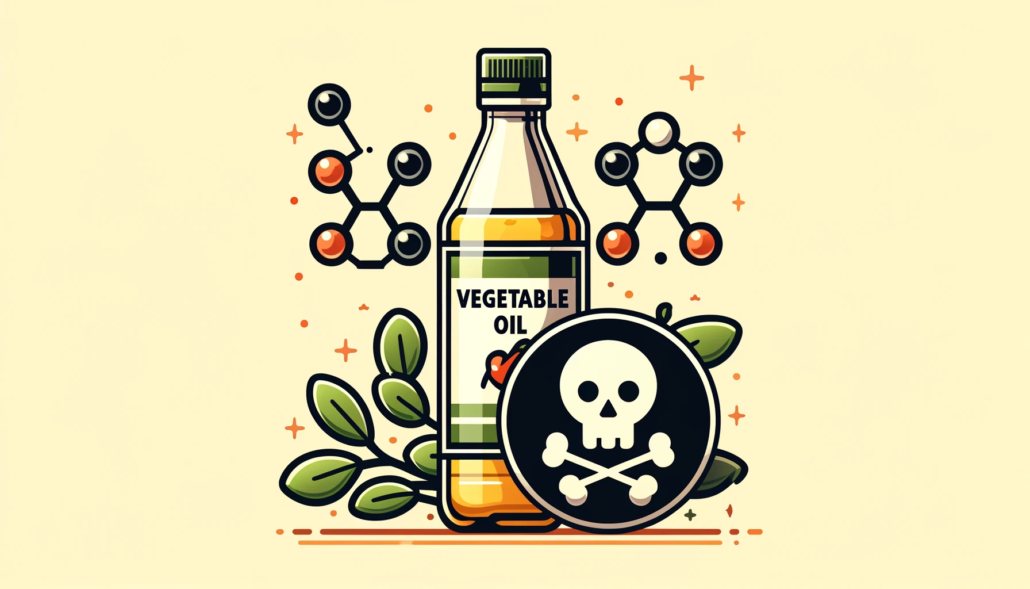We include products in articles we think are useful for our readers. If you buy products or services through links on our website, we may earn a small commission.
Meat for Mental Health vs. Vegetarian Depression

Numerous studies link eating meat with better mood and more stable mental health. Most of these studies compare meat eaters with vegetarians and vegans.
Likewise, numerous studies link vegetarianism with significantly greater incidences of depression and higher levels of anxiety.
Research on the role of meat eating and meat abstention (vegan/vegetarianism) is an important field as more governments and health institutions face pressure to assert a plant-based agenda.
The effects of meat eating and meat abstention on mental health should be considered in light of the 2017 statement by the World Health Organization (WHO) that across the world mental illness was the leading cause of disability.
In this article, we’ll explore the most recent research on the links between eating (or not eating) meat and mental health. And we’ll look at some of the key nutrients in meat that are likely responsible for the positive connection between meat and mental health.
Table of Contents
Meat and Mental health: A meta-analysis of meat consumption, depression, and anxiety (2021)
The highest quality and largest study to date looking at the link between meat and mental health was published in 2021 in the Journal of Food Science and Nutrition.

Here’s a rundown of the study findings:
- The analysis included data from 20 studies with 171,802 participants, 11-105 years old, from North America, Europe, Asia, and Oceania
- The authors found a “significant association between meat consumption/abstention and depression and anxiety”
- People who ate meat had lower average depression and anxiety levels than meat abstainers.
- Vegan and vegetarianism were linked with psychiatric disorders and a significantly greater likelihood of depression
- These findings held for both men and women
- Study quality (or lack of quality) explained differences between studies and accounted for the few studies that contradicted these findings.
- The higher the study quality, the more positive the benefit of meat consumption.
Vegetarian Diet and Depression Scores: A Meta-Analysis (2021)
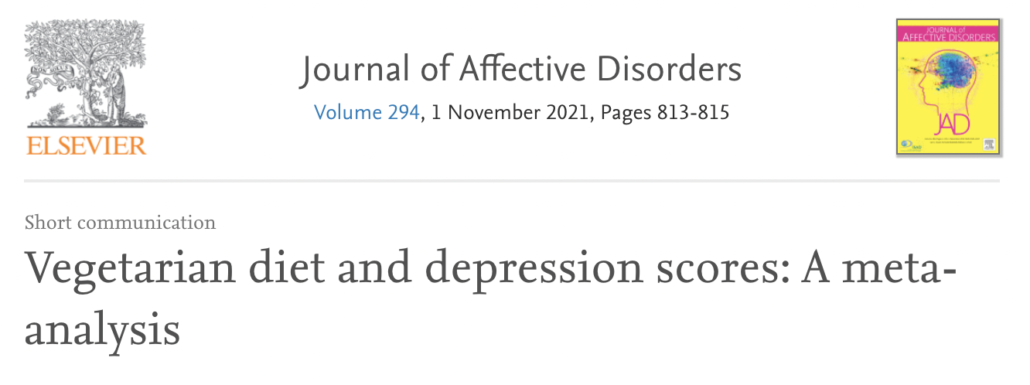
It’s not very often that two gold standard meta-analyses on a similar topic come out in the same year, but that’s what happened when this illuminating study was published in the Jounral of Affective Disorders.
Here’s a rundown of the study findings:
- 49,889 participants (8057 vegetarians and 41832 non-vegetarian controls) were included.
- The study controlled for urban/rural variables
- Vegetarians had significantly higher depression scores than non-vegetarians, and this was not influenced by sex (overall, women have greater incidences of depression than men)
The authors are careful to state that their study does not attribute causality, and does not determine if the onset of depression or anxiety occurred before or after cutting out meat.
Other Studies Exploring Meat and Mental Health
Let’s take a closer look at the details revealed by some of the smaller studies that were included in the above meta-analyses.
How does the health and well-being of young Australian vegetarian and semi-vegetarian women compare with non-vegetarians? (2007)

A 2007 longitudinal study of 14,247 women ages 22-27 found that 30 percent of vegetarians and semi-vegetarians had experienced depression in the previous 12 months. While 20 percent of meat eaters experienced depression.
Additionally, vegetarians and semi-vegetarians (those who did not eat red meat) had low iron levels and worse PMS (menstrual symptoms). Semi-vegetarians took more medications.
Vegetarian diet and mental disorders: results from a representative community survey (2012)

This study included 4,116 Germans designated as either vegetarian, predominantly vegetarians, and non-vegetarian.
The subjects were matched to account for numerous demographic and socioeconomic variables.
The researchers found that over the previous month, the previous year, and over their lifetimes, more vegetarians than meat eaters experienced depressive disorders.
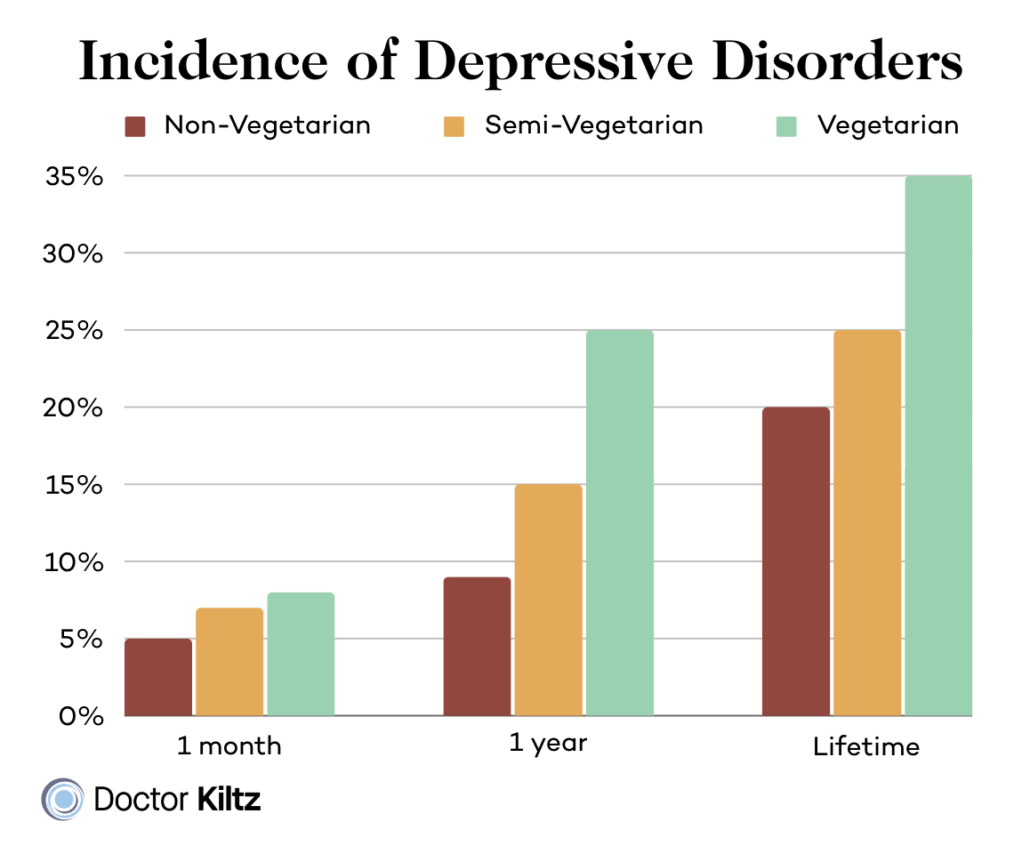
Depressive Symptoms and Vegetarian Diets: Results from the Constances Cohort (2018)

In this 2018 French study of 90,000 adults, researchers examined the impact of giving up various food groups on depressive symptoms among meat eaters, vegans, true vegetarians, and vegetarians who ate fish.
The researchers found that incidences of depression increased with each food group that participants gave up.
Participants who gave up at least three of four animal-based food groups (red meat, poultry, fish, and dairy) were at nearly 250% greater risk of depression.
Vegetarianism, depression, and the five-factor model of personality (2018)

This 2018 study from the College of William and Mary examined depression among 6,422 college students.
Vegetarian and semi-vegetarian students were found to be more neurotic and scored significantly higher than the omnivores on the Center for Epidemiologic Depression Scale.
Nutrition and Health – The Association between Eating Behavior and Various Health Parameters: A Matched Sample Study (2014)

In this 2014 Austrian study, researchers studied 330 vegetarians, 330 people who consumed a lot of meat, 330 omnivores who ate less meat, and 330 people who consumed a little meat and ate mostly fruits and veggies.
The subjects were carefully selected to match for sex, age, and socio-economic status.
The results were fascinating:
- A vegetarian diet is related to a lower BMI and less frequent alcohol consumption.
- A vegetarian diet is associated with poorer health (higher incidences of cancer, allergies, and mental health disorders)
- A vegetarian diet is associated with a greater need for health care, and a poorer quality of life
Does this mean that if we eat meat we should drink alcohol and not worry about our weight? Nope.
But it does suggest that there’s something insidiously unhealthy going on with the vegetarian diet. And it speaks to the fact that you can be metabolically healthy and mentally happy even if you’re carrying around some body fat.
What Links Meat with Better Mood, Lower Incidences of Depression?
None of the studies cited above identify a specific nutritional reason for the connection between meat and mental health and vegetarianism and depression.
But you don’t have to look hard to notice that meat and animal products are loaded with nutrients that have been clinically shown to boost mood, promote mental health, and reduce incidences of depression.
Let’s take a look at some of these key mental health-boosting nutrients that are found only in meat.
For example, studies tell us that vitamin B12, creatine, and taurine all play a significant role in the reduction of depression.
Vitamin B12
Numerous studies show that B12 supports mood and prevents depression and other psychiatric disorders.
As a meat-specific vitamin, vegans and vegetarians don’t get enough of it.
In fact, an analysis of numerous studies shows that B12 deficiency among vegetarians occurs across age, sex, and variations on vegetarian diets.5 B12 deficiency afflicts
- 62% of pregnant vegetarian women,
- Between 25% and 86% of vegetarian children
- 21–41% of vegetarian adolescents
- 11–90% of elderly vegetarians
B12 figures in numerous physiological and neurochemical pathways to support stable mood and mental health. While B12 deficiency has been shown to lead to the death of neurons and neurotransmitter signaling that leads to depression.
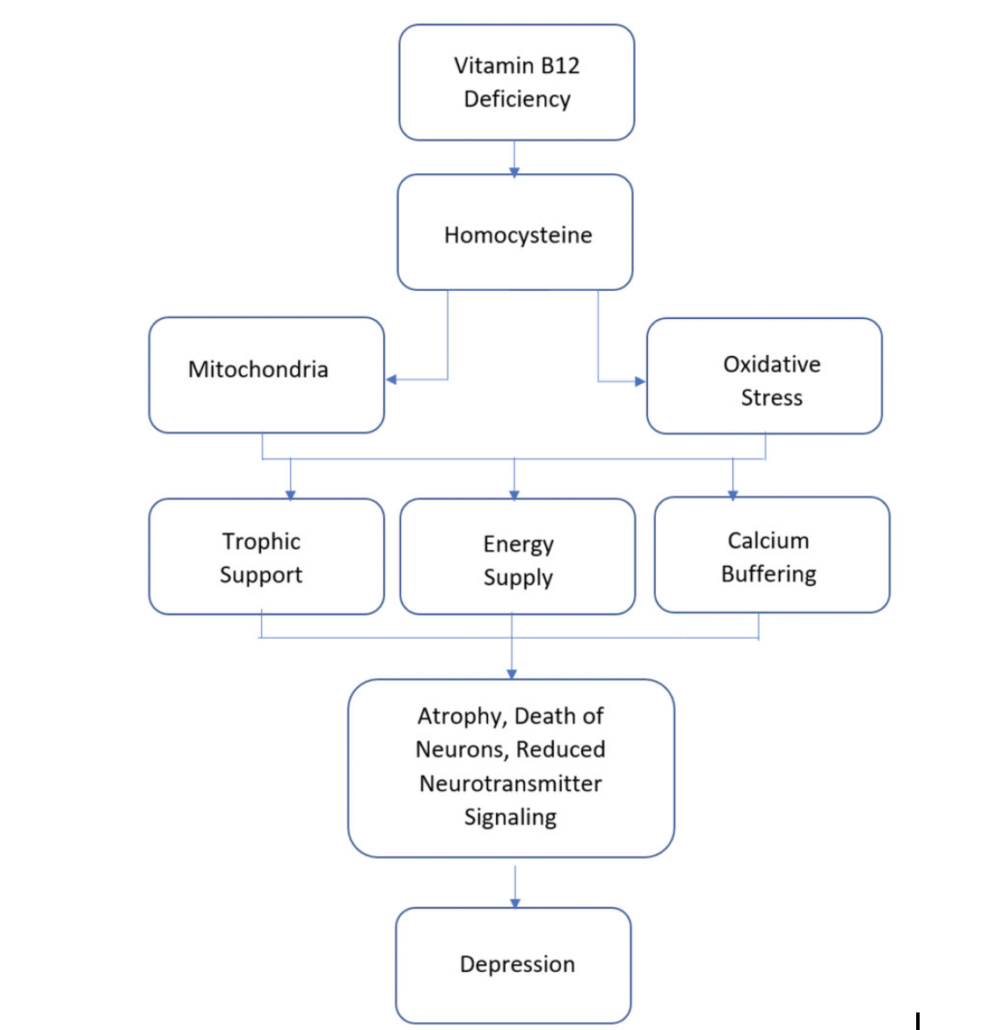
You can find a list of the top B12 foods here.
But if you’re looking for a quick recommendation, here are some go-to choices:
- beef liver (2471% per 100 g)
- Oysters (324% per 3.5 oz)
- Ribeye steak (142% RDV per 227 g)
Zinc
Zinc is a crucial nutrient that plays a key role in over 300 physiological processes, including maintaining neuronal systems linked to mental health. 5
Though zinc does exist in some plant foods, it is far less concentrated and bioavailable when compared to zinc in animal products.
In fact, studies state that iron and zinc are the nutrients at greatest risk of deficiency when going vegetarian.
Researchers have confirmed these concerns in studies showing that dietary zinc intakes and serum zinc concentrations were significantly lower in vegetarians than meat eaters.
This is because the grains that contain zinc also contain fiber and antinutrients like phytates that bind to zinc and inhibit digestive enzymes.
Not surprisingly, evidence suggests a link between low zinc levels and depression.5 While other studies show that zinc is effective in reducing both depressive and psychotic symptoms.
Animal-based foods high in zinc (per 100 grams) include;
| Oysters | 90.8mg | 825% |
| Ribeye Steak | 11mg | 100% |
| Alaskan King Crab | 7.6mg | 69% |
| Spiny Lobster | 7.3mg | 66% |
| Lamb Shoulder | 7.3mg | 66% |
| Ground Beef (70/30) | 6mg | 54% |
Creatine
Creatine is another meat-specific nutrient that vegetarians are deprived of.
Recent studies have shown creatine as a promising supplement compound for the treatment of depression. This is especially important considering that most traditional anti-depressants are little more than placebos.
Most people can get plenty of creatine by eating a diet centered around fresh, whole-animal foods. While low creatine levels are significantly associated with higher levels of depression–which may be a key to the higher incidences of depression among vegetarians. 5
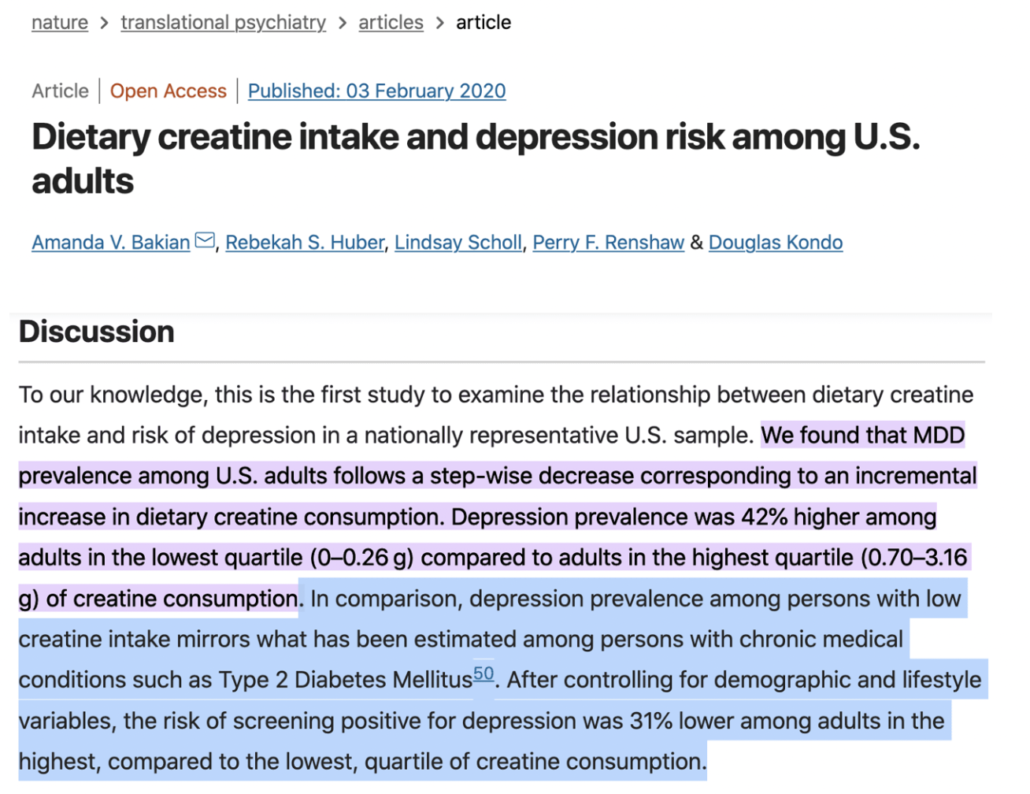
Taurine
Taurine is a semi-essential amino acid, meaning that our bodies produce some of it on their own, but we still need to top off from dietary sources.
In a 2016 study published in the Journal of Clinical Psychiatry, taurine supplementation was found to reduce mental health symptoms, including psychosis, while boosting positive markers of mental health in young people who had experienced their first psychotic episode.
Foods high in taurine include shellfish, dark meat, chicken, and red meat.
Eliminating Plant-Foods May be as Important as Eating Meat
Many people who practice the carnivore diet by eliminating all plant foods and eating only meat report resolving life-long mental disorders, including depression and anxiety.
Though these accounts are anecdotal, they point to the need for further study.
For example, Mikhaila Peterson, cued to the carnivore diet by Shawn Baker, adopted a steak, water, salt, elimination protocol.
Mikhaila credits eliminating plant foods and going carnivore with a full recovery from depression and anxiety. This inspired her father, the popular psychologist Jordan Peterson, to adopt the diet. Since then, Peterson has credited carnivore with the alleviation of psoriasis, digestive issues, and depression.
Data scientist and science writer Amber O’Hearn went carnivore in 2008 and credits the diet with resolving her bipolar depression and suicidal ideation that psychiatric medications hadn’t helped.
Influential psychiatrist Dr. Georgia Ede experimented with reducing plant foods and increasing fatty animal foods for over a decade before going full carnivore in 2018. She credits this journey to carnivore with reversing symptoms of fibromyalgia, chronic fatigue, migraines, and IBS. Now, she dedicates herself to educating others on the psychological benefits of this way of eating.
Meat and Mental Health: The Bottom Line
Numerous studies show that eating meat is associated with better markers of mental health and reduced rates of depression when compared with vegans and vegetarians.
This is likely due to the fact that animal products provide numerous vital nutrients that are not found in plant foods or are blocked from digestion by plant antinutrients.
It’s important to consider that humans evolved as hyper-carnivorous apex predators for over 2 million years. 4 Our bodies and brains are evolutionarily primed to operate on nutrients found in meat.
Not only did humans not get significant calories from plants for most of our time on earth (until the agricultural revolution around 8,000 years ago), but nearly all of the plants we consume did not exist for our ancestors.
It’s no wonder that consuming a vegetarian diet that is not aligned with our evolutionary physiology is linked with a higher incidence of depression and mental health disorders.















